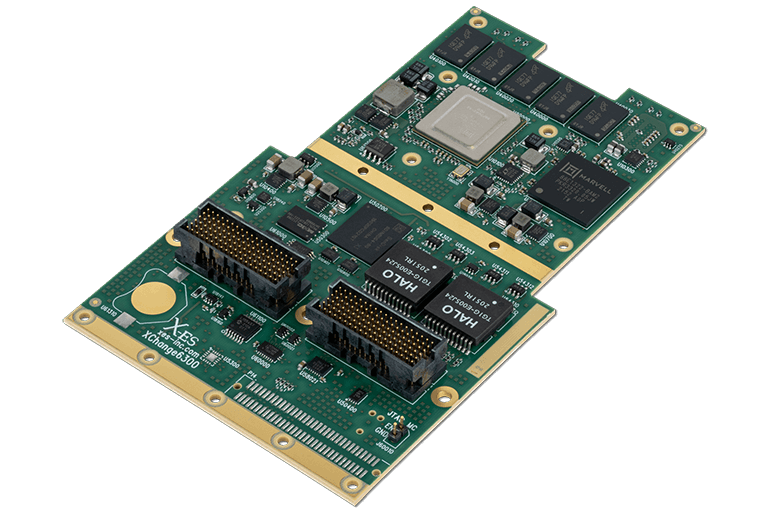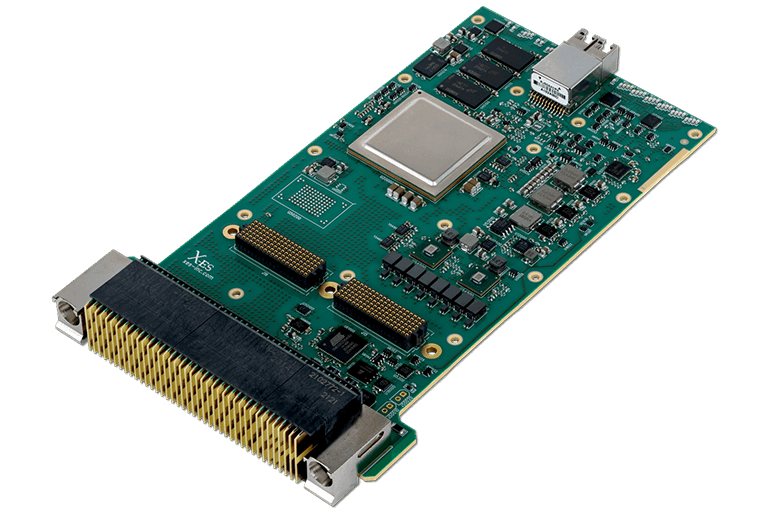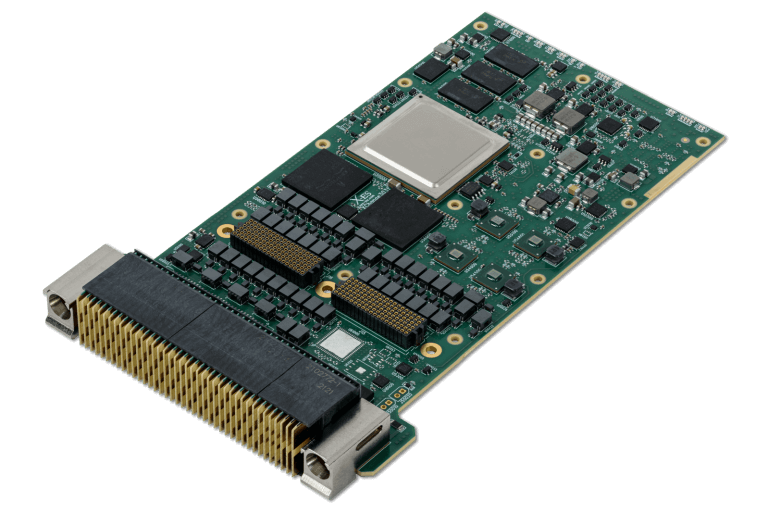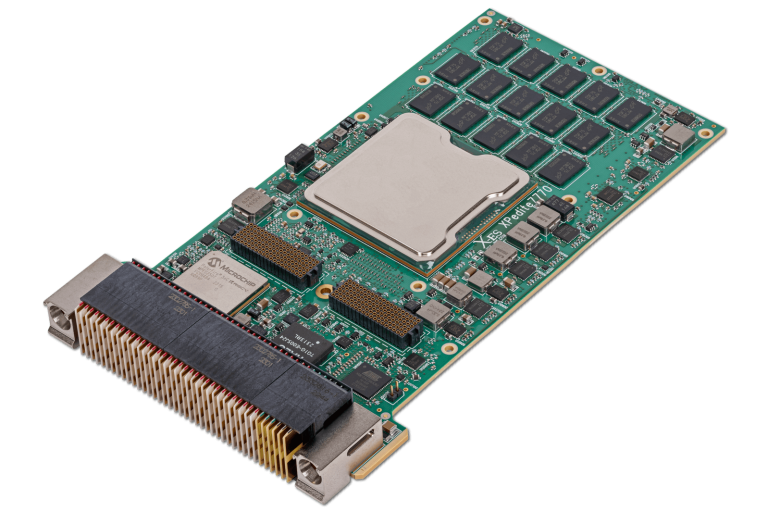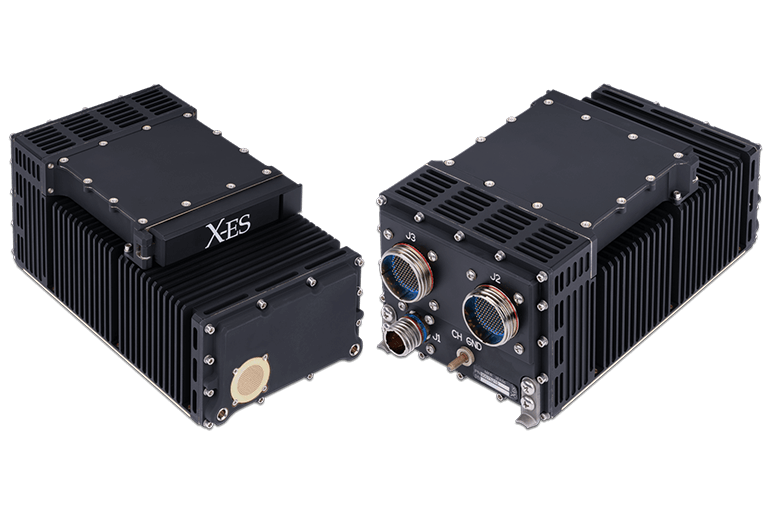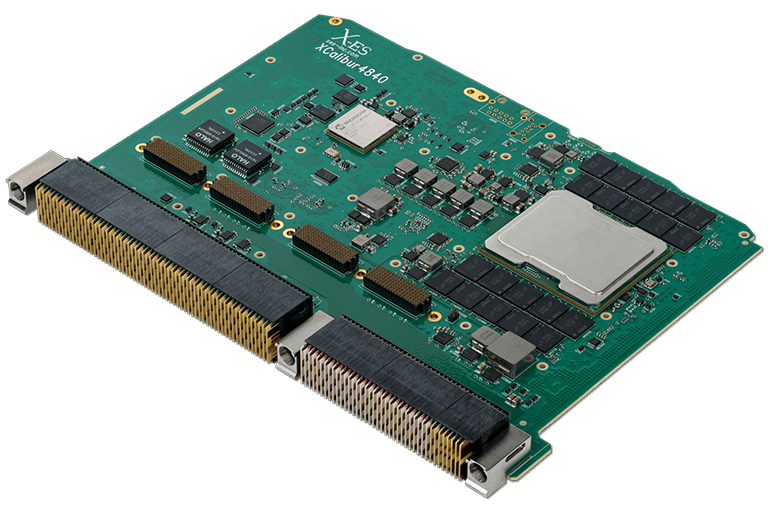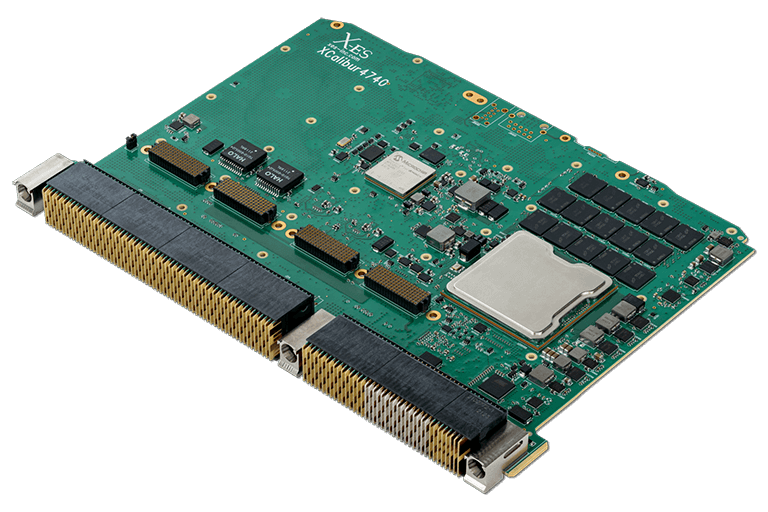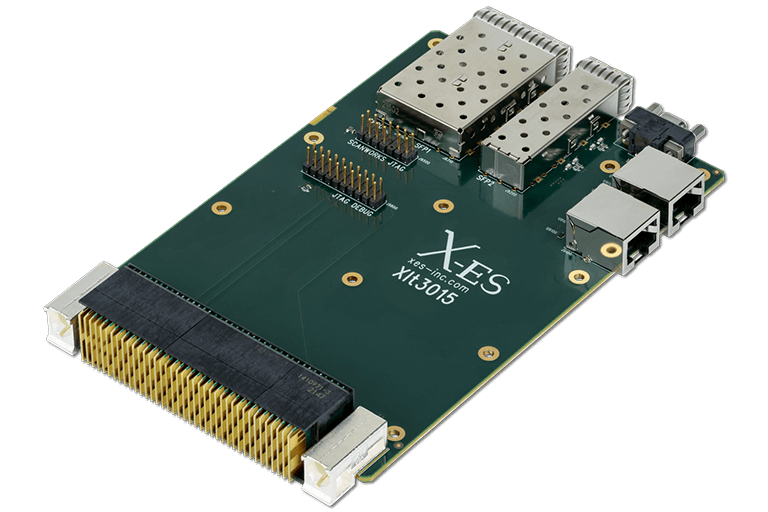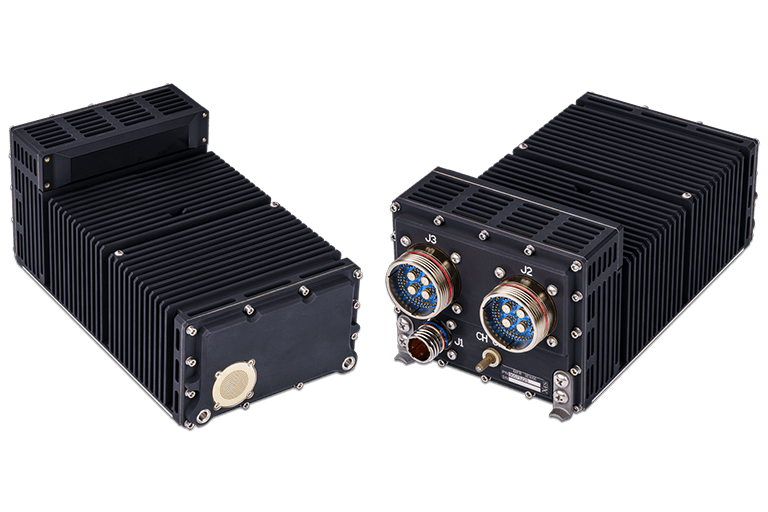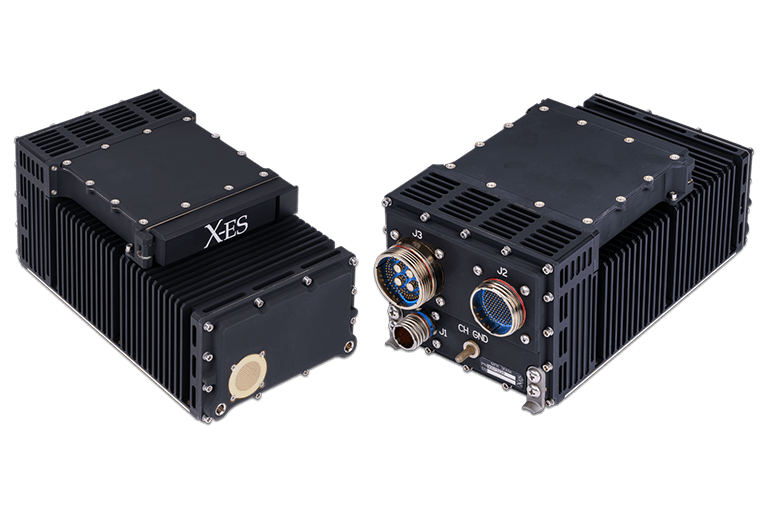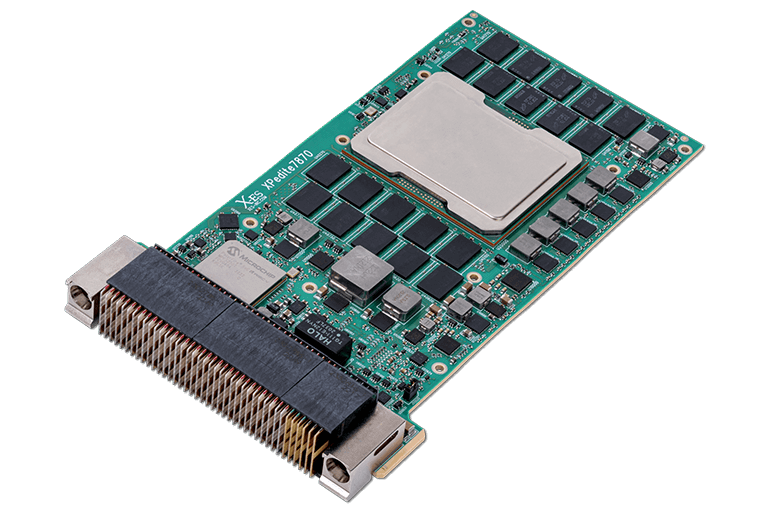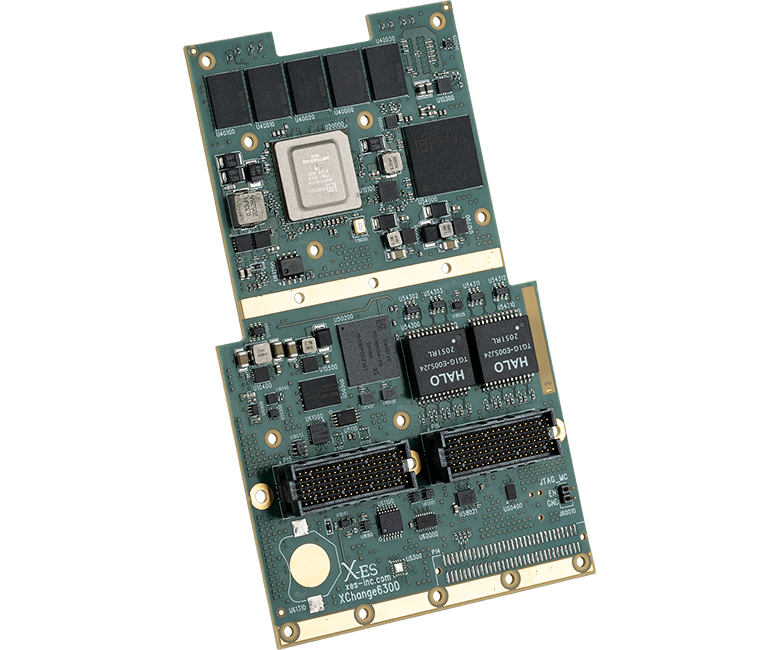The XChange6300 XMC/PMC-based Embedded Services Router (ESR) router runs Cisco IOS-XE® Software with Cisco Mobile Ready Net capabilities, providing highly secure data, voice, and video communications to stationary and mobile network nodes across wired and wireless links. When combined with UHF, VHF, Wi-Fi, and other radio platforms, the combination can create mobile ad hoc networks (MANETs), without requiring a connection to central infrastructure for military and emergency response. It extends the Cisco enterprise infrastructure beyond the reach of traditional fixed-network infrastructure for oil and gas, mining, smart grid, heavy construction, transportation, homeland security, and public safety applications.
The router offers two combo ports that can independently support either 10/100/1000BASE-T or 1000BASE-X Ethernet ports, as well as one fixed 1000BASE-X or 2500BASE-X Ethernet port directly from the CPU. The XChange6300 also offers a rich Cisco IOS-XE® Software feature set, suitable for the most Size, Weight, and Power (SWaP)-constrained applications. To meet the needs of demanding mobile and embedded networking applications, the XChange6300 ESR provides onboard hardware encryption to off-load encryption processing, radio aware routing (RAR) with support for the latest Dynamic Link Exchange Protocol (DLEP), support for IPv6, integrated threat control with Cisco IOS-XE® firewalls and Intrusion Prevention System (IPS), and Quality of Service (QoS). The XChange6300 ESR uses the same Cisco IOS-XE® that IT staffs in the military, energy, public safety, and other industries are already trained on, enabling these organizations to expand their network to personnel, equipment, facilities, and vehicles at the edge of the network – warfighters on the battlefield, mines and drilling platforms, natural disaster mobile command centers – without any additional training.
The XChange6300 ESR is a conduction-cooled XMC/PMC router card that can plug into existing sockets or be used in stand-alone applications. X-ES provides an XChange6300 development platform, along with ruggedized, deployable, packaged router systems.
Technical Specs
Memory
- 4 GB DDR4 ECC SDRAM
- Up to 128 MB NOR flash
- 128 kB SEEPROM
I/O Interfaces
- One 1000BASE-X or 2500BASE-X Ethernet SerDes port from CPU
- Two ports that can be independently configured as either 1000BASE-X or 10/100/1000BASE-T Ethernet ports
- One RS-232 or RS-422/485 serial port
Hardware Encryption Support
- Onboard hardware encryption processor supporting IP Security (IPsec)
- Secure Sockets Layer with transparent LAN services (SSL/TLS)
- Secure Real-Time Transport Protocol (SRTP)
- Triple Digital Encryption Standard (3DES)
- Advanced Encryption Standard (AES)
- Internet Key Exchange (IKE)
Routing Protocols
- Routing Information Protocol (RIP)
- RIPv2
- Open Shortest Path First (OSPF)
- Enhanced Interior Gateway Routing Protocol (EIGRP)
- Border Gateway Protocol (BGP)
- Cisco Discovery Protocol
- IP Policy Routing
- IP Multicast Protocol Independent Multicast (PIM) Versions 1 and 2
- Internet Group Management Protocol (IGMP) Versions 1 and 2
- IP Multicast Load Splitting
- Cisco Group Management Protocol (GMP)
VLANs
- Up to 32 VLANs supported per router
IPv4 and IPv6
- IPv6 routing and Cisco Express Forwarding switching
- IPv6 QoS
- IPv6 tunneling support
- Zone-based Firewall for IPv6 traffic
Encapsulations
- Point-to-Point Protocol (PPP)
- PPP over Ethernet (PPPoE) client and server for Fast Ethernet
- 802.1q VLAN trunking support
- Generic Routing Encapsulation (GRE)
- Additional protocol support
Telnet
- Asynchronous tunneling
- Storage Allocation and Coding (STAC) compression
- Real-time Transport Protocol (RTP) header compression
Radio Aware Routing
- Optimizes IP routing over fixed or temporary radio networks
- Factors radio link metrics into route calculations
- Immediately recognizes and adapts to changes in network neighbor status
- Dynamic Link Exchange Protocol (DLEP)
- Router Radio Control Protocol (R2CP)
- RFC 5578 (authored by Cisco®)
Mobile Ad Hoc Networks
- OSPFv3 enhancements for mobile ad hoc networks
Mobile IP
- Home agent and mobile router redundancy
- Mobile router preferred interfaces
- Mobile router reverse tunneling
- Mobile router asymmetric links
- Mobile router static and dynamic networks
- Static co-located care-of address
- Authentication, authorization, and accounting (AAA) server
- Cisco Mobile Networks Network Address Translation (NAT) Traversal over Mobile IP
- Support for Mobile IP tunnel templates, allowing configuration of IP Multicast and IPsec on Mobile IP tunnels
- Mobile IP foreign agent local routing optimization
Suite-B Support
- Suite-B support in IOS-XE® SW crypto including Suite-B-GCM-128, Suite-B-GCM-256, Suite-B-GMAC-128, Suite-B-GMAC-256 as described in RFC-4869
Authentication
- Route and router authentication
- Password Authentication Protocol (PAP)
- Challenge Handshake Authentication Protocol (CHAP)
- Microsoft CHAP (MS-CHAP) local password
- IP basic and extended access lists
- Time-based access control lists (ACLs)
Secure Connectivity
- Secure collaborative communications with Group Encrypted Transport VPN, Dynamic Multipoint VPN (DMVPN), or Enhanced Easy VPN
Integrated Threat Control
- Responding to sophisticated network attacks and threats using Cisco IOS-XE® Firewall, Cisco IOS-XE® Zone-based Firewall, Cisco IOS-XE® IPS, Cisco IOS-XE® Content Filtering, and Flexible Packet Matching (FPM)
Identity Management
- Intelligently protecting endpoints using technologies such as authentication, authorization, and accounting (AAA) and public key infrastructure (PKI)
Security Protocols
- IP Security (IPsec)
- Secure Sockets Layer with transparent LAN services (SSL/TLS)
- Secure Real-time Transport Protocol (SRTP)
- Triple Digital Encryption Standard (3DES)
- Advanced Encryption Standard (AES)
- Internet Key Exchange (IKE)
Traffic Management
- QoS
- Generic traffic shaping
- Class-based Ethernet matching and mobile access routing (802.1p Class of Service [CoS])
- Committed access rate
- Flow-based Weighted Random Early Detection (WRED)
- Class-based Weighted Fair Queuing (WFQ)
- Low Latency Queuing (LLQ)
- Priority Queuing
- Link Fragmentation and Interleaving (LFI)
- Traffic Policing Resource Reservation Protocol (RSVP)
Unified Communications
- Cisco Unified Communications Manager Express with support for up to 48 phones
Management Services
- Simple Network Management Protocol (SNMP) Versions 2 and 3
- Telnet
- Console port
- RADIUS
- TACACS+
- Cisco Service Assurance Agent
- Syslog
- Response Time Reporter
- Network Time Protocol (NTP) Client
- Trivial File Transfer Protocol (TFTP) Client and Server
- Dynamic Host Configuration Protocol (DHCP) Client and Server
- DHCP Relay
- Hot Standby Router Protocol (HSRP)
Tool Command Language (Tcl) Scripts
Address Conservation
- NAT Many-to-One (Port Address Translation [PAT])
- NAT Many-to-Many (Multi-NAT)
- DHCP Client Address Negotiation
- Easy IP Phase I
Physical Characteristics
- XMC/PMC conduction-cooled form factor
- Dimensions: 149 mm x 74 mm, 10 mm stacking height
Environmental Requirements
Contact factory for appropriate board configuration based on environmental requirements.
Power Requirements
- Power will vary based on configuration and usage. Please consult factory.
Documentation
Datasheet
To view all of the information about this product in a PDF, please download the datasheet.
Download Datasheet
Technical Documents
SupportNet is your source for product manuals, technical support, and software downloads.
Access SupportNet
